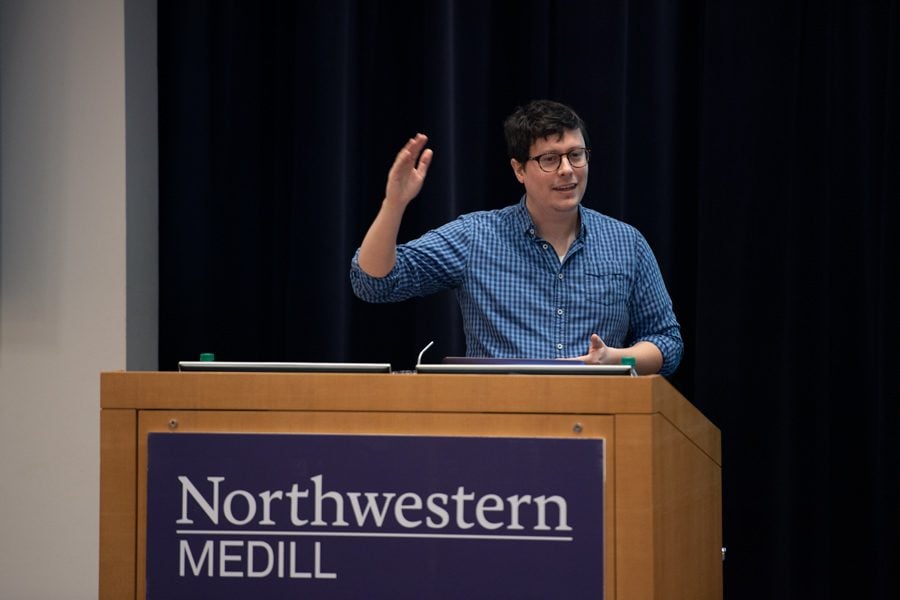Journalist says 2013 Supreme Court ruling gutted Voting Rights Act
Evan Robinson-Johnson/The Daily Northwestern
Rob Arthur talks about voter suppression in the McCormick Foundation Center Forum at a Tuesday event. Arthur found that recent changes made to voting procedures have been more detrimental to communities of color.
February 20, 2019
After examining data from 18 counties and looking at travel times between residences and polling places, journalist Rob Arthur discovered what he expected: polling place closures hit people of color harder.
“After the Voting Rights Act got shut down, areas that had been doing terrible Jim Crow things went right back to it and started closing polling places all over again,” Arthur said at a Tuesday event organized by the Residential College Board.
During the event, held in the McCormick Foundation Center Forum, Arthur elaborated on an October piece he co-authored for VICE — titled “How the gutting of the Voting Rights Act led to hundreds of closed polls” — in which he describes how the 2013 Supreme Court case Shelby County v. Holder changed the makeup of the electorate for the 2016 election.
In Shelby, the Supreme Court ruled part of the Voting Rights Act of 1965 unconstitutional. The section the Court struck down required certain states, counties and localities to have any changes to their local voting procedures cleared by the U.S. Attorney General because of a history of voter suppression. The 2013 decision removed preclearance requirements, allowing the places on the list that formerly needed their procedures checked to make changes without federal approval.
The resulting changes, which include alterations to voter registration laws and closures of polling places, stop large numbers of low-income and non-white people from voting, Arthur said.
“It ends up locking a lot of people out of the electoral process,” he said. “And that’s not an accident.”
When Arthur decided he wanted to “quantify voter suppression,” he looked at polling place closures. Arthur and Allison McCann, a visual journalist for The New York Times, compared the number of open polling places in 2012 — before the Shelby case — and in 2016. What they found was that counties that used to be subject to preclearance, there were 10 percent more people per polling place in 2016 than there were in 2012.
Arthur said that’s what he expected to find.
“The more people you have per polling place, the longer the lines are, the harder it is to get to vote and the longer you have to get to polling places,” he said. “So this was confirmation for us.”
Arthur said he also found that states with legislatures under Republican control were much more likely to have discriminatory practices than those with state legislatures under Democratic control.
He added that even since 2006, the last time the Voting Rights Act was renewed, increasing accessibility to polling places has become a “partisan thing.”
“Anything that would make it easier (to vote) has become opposed by Republicans,” he said. “I just want to point out that this — what used to be a non-partisan issue — is now broken down strictly on party lines.”
Arthur said there was “some hope, maybe” for a Voting Rights Act replacement that could potentially include a new preclearance list and cover more areas of the U.S.
Medill first-year Virginia Langmaid, who was a poll worker in her home state of Georgia during the 2016 election, said hope for a replacement was her main takeaway from Arthur’s talk.
“A lot of times the conversation can tend toward to, ‘And then in Shelby v. Holder we ended the VRA,’” she said. “And that’s true. But things evolve, and there are people trying to reinstate the VRA, and we should be listening to their proposals and actually be having critical opinions on them.”
Weinberg senior Joseph Kim, Residential College Board’s vice president for academic affairs, said he reached out to Arthur to speak because he thought people would be interested in what Arthur had to say.
“We discussed the topics he’d feel comfortable covering, and this pertained both politically to recent times, and Northwestern is a relatively politically active campus, so I thought it would be kind of a fun thing,” Kim said.
Email: [email protected]
Twitter: @cam_e_cook
Related Stories:
— Marc Lamont-Hill talks black activism and voting third party at annual FMO event
— Appeals court stays ruling on same-day voter registration


